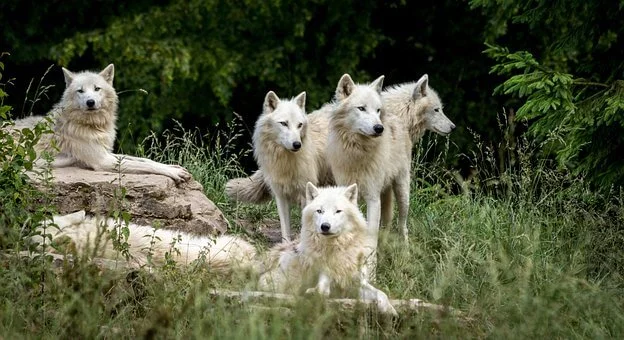Wolves have long been a popular symbol in literature, movies, and other forms of popular culture. They are often portrayed as powerful, mysterious, and fiercely independent creatures that evoke a sense of awe and respect.
Many fictional works have featured wolves as characters, and their names have become an important part of the stories in which they appear.
Some examples of Wolf Names from Books & Movies include:
- Harry Potter series: Sirius Black (werewolf)
- The Hobbit: Beorn (shapeshifter)
- The Chronicles of Narnia: Aslan (a lion, but often symbolizes Jesus Christ)
- The Song of Ice and Fire series: Ghost, Nymeria, Summer, Shaggydog, Grey Wind (direwolves)
- The Hunger Games series: Katniss Everdeen (mentioning wolves)
- The Inheritance Cycle: Eragon (mentioning wolves)
- The Redwall series: Martin the Warrior (mentioning wolves)
- The Jungle Book: Shere Khan (tiger)
- The Call of the Wild: Buck (mentioning wolves)
- The Wolves of Willoughby Chase: Bonnie Green (mentioning wolves)
Note that some of the characters mentioned are not wolves but are associated with wolves in some way.
Related: How Much Can a Wolf Eat in a Day?
Additional Wolf Names from Movies & Books
- Twilight series: Jacob Black (werewolf)
- Twilight series: Edward Cullen (vampire)
- The Wolf Gift: Jacob Marlowe (werewolf)
- The Shape of Water: Amphibian Man (humanoid amphibian)
- The Lion King: Simba (lion)
- The Bears of Blue River: Balser De Spain (bear)
- The Secret of NIMH: Jeremy (rat)
- The Jungle Book: Baloo (bear)
- The Wild: Ryan (lion)
- The Very Hungry Caterpillar: The Caterpillar (caterpillar)
This is not an exhaustive list and there are many more examples out there.
Wolf names in literature
In literature, wolf names often play a key role in shaping the characters and the narrative of the story. In the Harry Potter series, for example, the character of Fang is a loyal companion to Hagrid and plays an important role in the series.
The name “Fang” evokes a sense of power and strength, which is fitting for the character. Similarly, in Game of Thrones, the character of Robb Stark has a direwolf named “Grey Wind” who is known for his speed and ferocity in battle.
The name “Grey Wind” reflects the character’s military prowess and the sense of danger that surrounds him.
Wolf names in movies and television
In movies and television, wolf names are also significant. The animated movie Balto tells the story of a wolf-dog hybrid who leads a sled dog team to deliver medicine to a remote Alaskan village. The character’s name, “Balto,” reflects his strength, courage, and loyalty.
Similarly, in The Jungle Book, the character of Mowgli is raised by wolves and is protected by a pack led by the wolf “Akela.” The name “Akela” means “graceful” in Hindi and reflects the character’s leadership and the pack’s loyalty to him.
The use of wolf names in popular culture
The symbolism of wolf names goes beyond literature and movies. In popular culture, wolf names are often used to convey a sense of strength, loyalty, and wildness.
Many sports teams, such as the Minnesota Timberwolves and the Arizona Coyotes, use wolf names as their mascots, reflecting the team’s strength and ferocity. In online gaming, players often use wolf names as their usernames, reflecting their connection to the natural world and their love of wolves.
The symbolism of wolf names
The symbolism of wolf names goes deeper than just their connection to popular culture. Wolves have been a powerful symbol in mythology and folklore for centuries. In Native American culture, wolves are often seen as spiritual guides and symbols of loyalty, strength, and wisdom.
In Norse mythology, the wolf Fenrir is a symbol of chaos and destruction, while in Hindu mythology, the wolf is seen as a symbol of transformation and power.
Conclusion
Wolf names from books and movies are an important part of popular culture. These names reflect the strength, loyalty, and wildness of wolves, and they play a key role in shaping the characters and the narrative of the stories in which they appear.
Whether in literature, movies, or popular culture, wolf names will continue to be an important symbol for generations to come.
